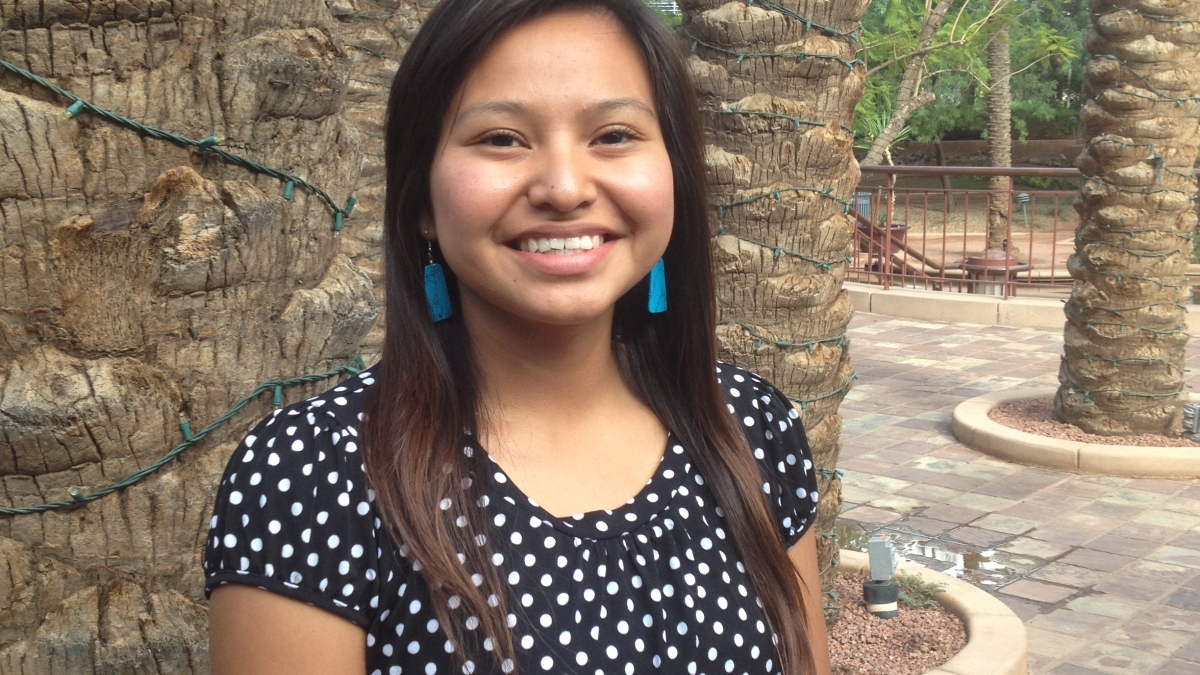Navajo student to return home, fight chronic diseases after graduation

Editor's Note: This story is part of an ongoing series about student excellence at the university. To read more about some of ASU's outstanding students, click here.
Kristy Peshlakai will return to her Navajo Nation home after graduating from Arizona State University to teach people how to stay healthy in the fight against chronic diseases such as diabetes and HIV.
Through her exercise and wellness major, with a concentration in health promotion, the ASU senior is learning about the importance of nutrition and exercise to prevent diabetes, a disease that is common among the Native population and one that was recently diagnosed in a close relative.
“I really want to learn about this disease and how we can prevent it," Peshlakai says. "A lot of people don’t know about how food consumption can be so dangerous. There are so many foods that have a lot of fats and sugar in them. If you don’t control your blood sugar, you can lose your eyesight or have amputations. Prevention is the key before it gets serious.”
Inspiration for her chosen field came from personal experience and an internship at Northern Navajo Medical Center in Shiprock, N.M, where she worked on events such as fun walks and taught exercise and education to residents of the area, from children to elders.
“I really like seeing all the elderly, children and families coming together. It brought joy to my heart to see our Native people exercising for a good cause for their health. They would come from quite a ways to participate and enjoy their time exercising and being with other Native Americans across the reservation,” Peshlakai said.
Peshlakai will be the first in her family to graduate from college. Earning her degree is something that she is working on for herself and for her parents, especially her mother, who raised five siblings largely on her own.
“My father helped my mother along the way and he was our support too, but my mother was the one who encouraged us to get a better education,” she said. “My mother didn’t get the chance to finish her education. I am doing this for her and to make her proud. If she wasn’t able to do this then I will do it for her.”
Coming to ASU from her home outside of Shiprock, N.M. was an adjustment for Peshlakai as she became used to living in a large city and being away from her family back home. Although she was accepted at Northern Arizona State University and New Mexico State University, she chose ASU.
“One of my good friends told me about his experiences at ASU and about Native American programs and how they were very supportive,” she said.
Getting involved in organizations such as Nations helped her transition to the university.
“I was a little scared at first. When school started, I was able to adjust. I really enjoy meeting new people,” she said. “Nations is where I met different Native Americans from other campuses. We’re still friends today and encourage one another.”
Peshlakai also took part in the Tribal Nations Tour last summer, where students travelled across Arizona to talk about higher education to Native high school, junior high and elementary students.
“We talk to young people about our struggles and successes. Some students had similar experiences and we gave them hope that they are not the only ones who have been through a lot. We showed them that they can do it. After our presentation, some students would approach us and tell us that they want to go college,” she said.
Encouraging words that she passed on to prospective students were to get involved and meet new people through student organizations and networking. A good attitude also doesn’t hurt.
“Have that positive mindset and learn from your mistakes. Reflect back on your family that you want to make proud,” she said.
While many people leave the reservation when they go to school and never return, Peshlakai wants to earn her master’s degree so she can teach healthy habits.
“When I was growing up, I didn’t know what diabetes or HIV was. I want to be that role model in the community who steps up, makes a change, leads the community to a healthier lifestyle and decreases the rate of diabetes,” she said.